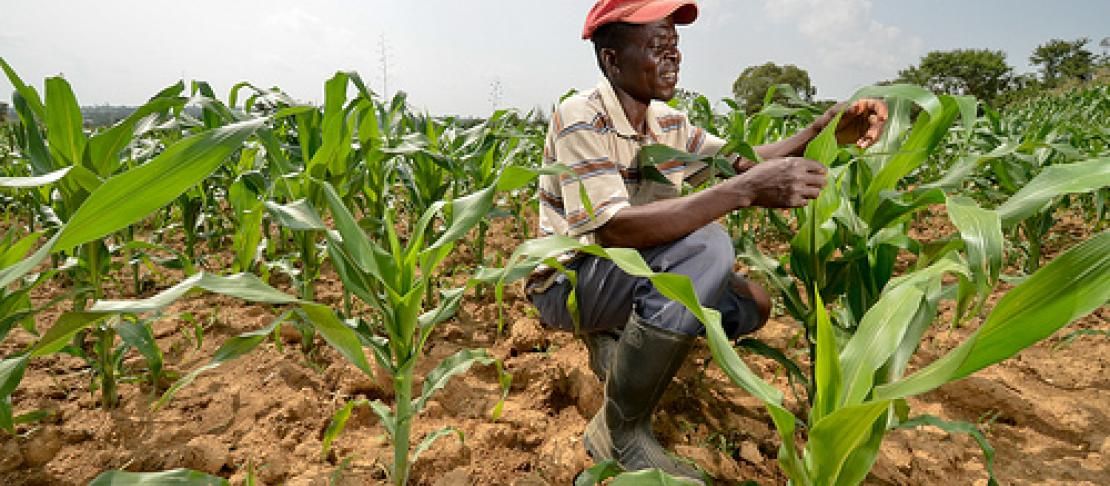‘Buttering the parsnips’ – how to ensure research has an impact

by Simon Bager
“Fine words butter no parsnips” is an English expression meaning that nothing is achieved through empty words or flattery. At conferences and meetings, participants can often be left with the feeling that the parsnips are never buttered – there are always a lot of nice words, but rarely anything concrete is achieved. We never seem to be able to butter the parsnips with all our fine words about fighting hunger or combatting climate change.
The conference on Hunger, Nutrition and Climate Justice that took place in Dublin Castle, Ireland, on 15-16 April 2013 promised to be different. This conference was about bringing the voices of those affected by climate change, hunger, and malnutrition to the discussion, and together moving forward on combatting these challenges.
The second day of the conference featured a session themed around moving from learning to leading and had inputs from, amongst others, Mrs Amina Mohammed, Member of the UN High-Level Panel on the Post-2015 Development Agenda, and Mr Dyborn Chibonga, CEO of the National Smallholder Farmers’ Association of Malawi (NASFAM).
Impact on the ground
At the session, several panellists noted the need to listen to and work with the people on the ground – those who are experiencing the challenges associated with climate change and hunger. A panellist noted that research must be “influenced by what the people want.” A similar wish was expressed in a learning circle at the conference, where a participant hoped to see demand-driven and not supply-driven research, which incorporates local and indigenous knowledge with scientific research in a circular system with regular feedbacks on progress.
To address some of these challenges and lack of connections between local, national and international communities, the CGIAR Research Program on Climate Change, Agriculture and Food Security (CCAFS) practices participatory action research, with farmers and other local groups playing a key role in the research process. At four CCAFS sites in East Africa, researchers held participatory action research workshops last November to develop robust crop suitability and prediction models and help better understand the constraints and opportunities for adaptation: East Africa reached by participatory action research activities.
Listen, learn, lead
Going from listening to doing – that is, actually buttering the parsnip – is a central part of CCAFS’ work. One of the sub-research themes is on Linking knowledge with Action. Within this theme, CCAFS explores the linkages that ensure that research translates into action that can support and contribute to sustainable poverty reduction on the ground. A key lesson of this work is to keep farmers at the centre of all efforts, listen to their challenges and experiences, open up dialogues and create common spaces for knowledge sharing.
This particular insight was also expressed by a panellist, who noted that success depends on progress at the grassroots level. Mr Tony Lake, the Executive Director of UNESCO, reminded the panellists and the audience that genuine progress is often a question of political will, since the science is often there already. His approach was to ‘educate, agitate and organize’ – a sentiment that was shared by several panellists who all stressed the importance that smallholder farmers organize and form collective groups.
Communicating through technology
While organizing is important for getting heard, technology is increasingly important in bringing information to smallholder farmers. CCAFS is involved in several projects that explore the use of technology or communication avenues in improving farming. One of these is a project in Senegal where improved climate-forecasting help farmers select the right crops and planting dates. This project was also featured as a case study example at the conference – you can read more about it here.
The case study from Senegal and the comments by panellists underlines the transformative power of information and communications technology; now that almost every farmer can afford a cell phone, spreading information on climate, crops, market prices, etc. is easier than ever before.
Besides ICT, a panellist also highlighted the need for data and access to data to spur innovation. Together with eight CGIAR centres, CCAFS runs AgTrials.org, an information portal which provides access to a database on the performance of agricultural technologies at sites across the developing world. Learn more about AgTrials.
The dialogue both opened and ended with panellists emphasizing the need for action. There is less than 1000 days to 2015, the deadline for the sustainable development goals, and the climate change negotiations under the auspices of the United Nations will commence again in December. There is a need to push governments to come together on a consensus, and to bring agriculture to the centre of negotiations, because as one panellist noted: “We are all in this together.”
Simon Bager is a Research Assistant at the CGIAR Research Program on Climate Change, Agriculture and Food Security (CCAFS). The CCAFS team reported live from the Hunger, Nutrition, Climate Justice conference in Dublin from 15-16 April 2013. Watch live webcasts at www.eu2013.ie and view updates on the CCAFS blog. Engage with us on twitter @cgiarclimate using #HNCJ.